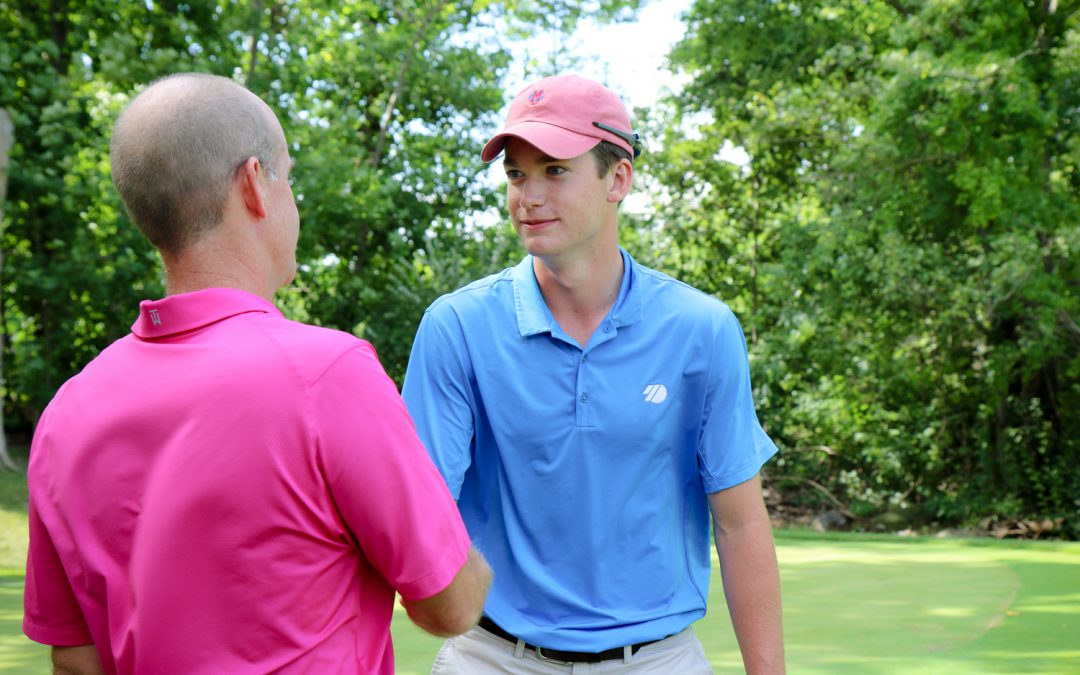Let’s say you’ve secured a meeting with the head coach at the golf program of your dreams. The coach has agreed to an in-person meeting on an unofficial visit. You walk into the coach’s office and realize that this is a different level. NCAA championship banners fly from the walls. The coach’s resume includes PGA Tour events and a handful of major championship appearances.
The conversation starts out fine and about ten minutes in you are confronted with the inevitable question: Why my program?
You have now entered the lair of the tricky question! Not to worry though, your Hub friends will give you the skills to help navigate your way through. Questions like ‘why my program’ are tough because they are so open-ended (like the infamous “tell me a bit about yourself”) and can be answered in a nearly infinite number of ways.
But there is an art to answering them well.
Consider the following two answers to start:
“I have done a lot of research on your golf program. I love how competitive the program is and I have heard the practice facilities are first rate. I like the team members I’ve met so far and really think I can contribute to the team’s success.”
“Um, don’t really know, guess I never considered it. I was just here to learn what you had to offer and sort of guess you guys are pretty competitive, so that’s nice.”
Which one works better?
You guessed it. The first one is Hub-approved and the second one as well, let’s just admit it…a train wreck.
But why?
Let’s understand why the first one works so well:
- It uses “I” statements:
Look at the first word of each sentence in the first answer. What does each sentence begin with? An “I” statement!
In human communication “I” statements are associated with a vital life skill called assertiveness, which is the ability to share and express your views constructively with other people. Assertiveness is different from other forms of human communication like passivity or aggressiveness.
“I” statements work well because they assert your needs and views in a constructive fashion, demonstrate a healthy dollop of self-esteem, and often demonstrate determination. Don’t believe us? Consider the creed of the top D-I program University of Arizona: I am. I can. I will. All are “I” statements. You get the picture!
Of course, don’t overdo a good thing or you will sound wooden, but practice responding to those tricky questions with a heavy dollop of “I.”
- It expresses your feelings:
“I” statements pair extremely well with statements on how you feel.
For example, the answer above uses “I love” in the second sentence. This gives a coach emotional context, letting them know not just the cold hard logic of why but also how you feel and what their program means to you.
Don’t be afraid to use a healthy dose of feeling mixed with your answers. Statements like “I am really excited about the opportunity to play for your program” or “I’m excited to hear more about your program” let the coach know just how you feel and can give you a communication edge.
- It includes how you can help the coach:
Like it or not, people are self-interested. Not exclusively so, of course, but we are wired to have our own interests in mind. The answer above works particularly well because it shows that you believe you can help the team grow and get better. Jackpot!
And just for the heck of it, let’s analyze why the second answer is so bad.
One phrase sums it up: too passive.
It’s passive all the way from the “um” at the start, to not being prepared in the first place, to the frequent use of hedging language (I guess, sort of). Couple this with some weak body language (eyes pointed down, shoulders slouched) and rather than being a bright, shiny flower proudly displaying its wares, you are more like a limp reed tottering in the wind.
That will not get it done!
Practice the tips above with other big open-ended questions like: Tell me a bit about yourself? How can you help my program? We recommend you role play with a parent to really get the hang of it. After a while, you’ll master the skill just like riding a bike and will be well on your way towards making a great first impression on the coach.


